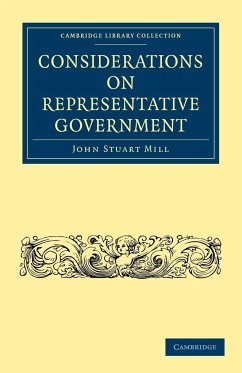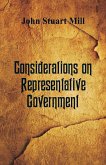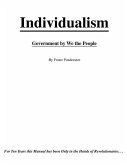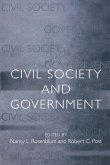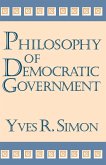John Stuart Mill
Considerations on Representative Government
John Stuart Mill
Considerations on Representative Government
- Broschiertes Buch
- Merkliste
- Auf die Merkliste
- Bewerten Bewerten
- Teilen
- Produkt teilen
- Produkterinnerung
- Produkterinnerung
A detailed discussion of the theories of democracy of John Stuart Mill (1806 73), first published in 1861.
Andere Kunden interessierten sich auch für
![Considerations on Representative Government Considerations on Representative Government]() John Stuart MillConsiderations on Representative Government26,99 €
John Stuart MillConsiderations on Representative Government26,99 €![Utilitarianism Explained and Exemplified in Moral and Political Government Utilitarianism Explained and Exemplified in Moral and Political Government]() Charles TennantUtilitarianism Explained and Exemplified in Moral and Political Government57,99 €
Charles TennantUtilitarianism Explained and Exemplified in Moral and Political Government57,99 €![Modernity and What Has Been Lost: Considerations on the Legacy of Leo Strauss Modernity and What Has Been Lost: Considerations on the Legacy of Leo Strauss]() Modernity and What Has Been Lost: Considerations on the Legacy of Leo Strauss31,99 €
Modernity and What Has Been Lost: Considerations on the Legacy of Leo Strauss31,99 €![Individualism: Government By We The People Individualism: Government By We The People]() Frater PonderatorIndividualism: Government By We The People9,99 €
Frater PonderatorIndividualism: Government By We The People9,99 €![Civil Society and Government Civil Society and Government]() Nancy L. Rosenblum / Robert C. Post (eds.)Civil Society and Government49,99 €
Nancy L. Rosenblum / Robert C. Post (eds.)Civil Society and Government49,99 €![Philosophy of Democratic Government Philosophy of Democratic Government]() Yves R. SimonPhilosophy of Democratic Government40,99 €
Yves R. SimonPhilosophy of Democratic Government40,99 €![Deleting the State: An Argument about Government Deleting the State: An Argument about Government]() Aeon J. SkobleDeleting the State: An Argument about Government27,99 €
Aeon J. SkobleDeleting the State: An Argument about Government27,99 €-
-
-
A detailed discussion of the theories of democracy of John Stuart Mill (1806 73), first published in 1861.
Hinweis: Dieser Artikel kann nur an eine deutsche Lieferadresse ausgeliefert werden.
Hinweis: Dieser Artikel kann nur an eine deutsche Lieferadresse ausgeliefert werden.
Produktdetails
- Produktdetails
- Verlag: Cambridge University Press
- Seitenzahl: 360
- Erscheinungstermin: 24. September 2010
- Englisch
- Abmessung: 216mm x 140mm x 21mm
- Gewicht: 508g
- ISBN-13: 9781108023535
- ISBN-10: 1108023533
- Artikelnr.: 32885394
- Herstellerkennzeichnung
- Libri GmbH
- Europaallee 1
- 36244 Bad Hersfeld
- gpsr@libri.de
- Verlag: Cambridge University Press
- Seitenzahl: 360
- Erscheinungstermin: 24. September 2010
- Englisch
- Abmessung: 216mm x 140mm x 21mm
- Gewicht: 508g
- ISBN-13: 9781108023535
- ISBN-10: 1108023533
- Artikelnr.: 32885394
- Herstellerkennzeichnung
- Libri GmbH
- Europaallee 1
- 36244 Bad Hersfeld
- gpsr@libri.de
John Stuart Mill (20 May 1806 - 7 May 1873) was an English philosopher, political economist, politician and civil servant. One of the most influential thinkers in the history of classical liberalism, he contributed widely to social theory, political theory, and political economy. Dubbed "the most influential English-speaking philosopher of the nineteenth century" by the Stanford Encyclopedia of Philosophy,[11] he conceived of liberty as justifying the freedom of the individual in opposition to unlimited state and social control.[12]Mill was a proponent of utilitarianism, an ethical theory developed by his predecessor Jeremy Bentham. He contributed to the investigation of scientific methodology, though his knowledge of the topic was based on the writings of others, notably William Whewell, John Herschel, and Auguste Comte, and research carried out for Mill by Alexander Bain. He engaged in written debate with Whewell.[13]A member of the Liberal Party and author of the early feminist work The Subjection of Women, Mill was also the second member of Parliament to call for women's suffrage after Henry Hunt in 1832
1. To what extent forms of government are a matter of choice
2. The criterion of a good form of government
3. That the ideally best form of government is representative government
4. Under what social conditions representative government is inapplicable
5. Of the proper functions of representative bodies
6. Of the infirmities and dangers to which representative government is liable
7. Of true and false democracy. Representation of all and representation of the majority only
8. Of the extension of the suffrage
9. Should there be two stages of election?
10. Of the mode of voting
11. Of the duration of Parliaments
12. Ought pledges to be required from Members of Parliament
13. Of a second chamber
14. Of the executive in a representative government
15. Of local representative bodies
16. Of nationality, as connected with representative government
17. Of federal representative governments
18. Of the government of dependencies by a free state.
2. The criterion of a good form of government
3. That the ideally best form of government is representative government
4. Under what social conditions representative government is inapplicable
5. Of the proper functions of representative bodies
6. Of the infirmities and dangers to which representative government is liable
7. Of true and false democracy. Representation of all and representation of the majority only
8. Of the extension of the suffrage
9. Should there be two stages of election?
10. Of the mode of voting
11. Of the duration of Parliaments
12. Ought pledges to be required from Members of Parliament
13. Of a second chamber
14. Of the executive in a representative government
15. Of local representative bodies
16. Of nationality, as connected with representative government
17. Of federal representative governments
18. Of the government of dependencies by a free state.
1. To what extent forms of government are a matter of choice
2. The criterion of a good form of government
3. That the ideally best form of government is representative government
4. Under what social conditions representative government is inapplicable
5. Of the proper functions of representative bodies
6. Of the infirmities and dangers to which representative government is liable
7. Of true and false democracy. Representation of all and representation of the majority only
8. Of the extension of the suffrage
9. Should there be two stages of election?
10. Of the mode of voting
11. Of the duration of Parliaments
12. Ought pledges to be required from Members of Parliament
13. Of a second chamber
14. Of the executive in a representative government
15. Of local representative bodies
16. Of nationality, as connected with representative government
17. Of federal representative governments
18. Of the government of dependencies by a free state.
2. The criterion of a good form of government
3. That the ideally best form of government is representative government
4. Under what social conditions representative government is inapplicable
5. Of the proper functions of representative bodies
6. Of the infirmities and dangers to which representative government is liable
7. Of true and false democracy. Representation of all and representation of the majority only
8. Of the extension of the suffrage
9. Should there be two stages of election?
10. Of the mode of voting
11. Of the duration of Parliaments
12. Ought pledges to be required from Members of Parliament
13. Of a second chamber
14. Of the executive in a representative government
15. Of local representative bodies
16. Of nationality, as connected with representative government
17. Of federal representative governments
18. Of the government of dependencies by a free state.

